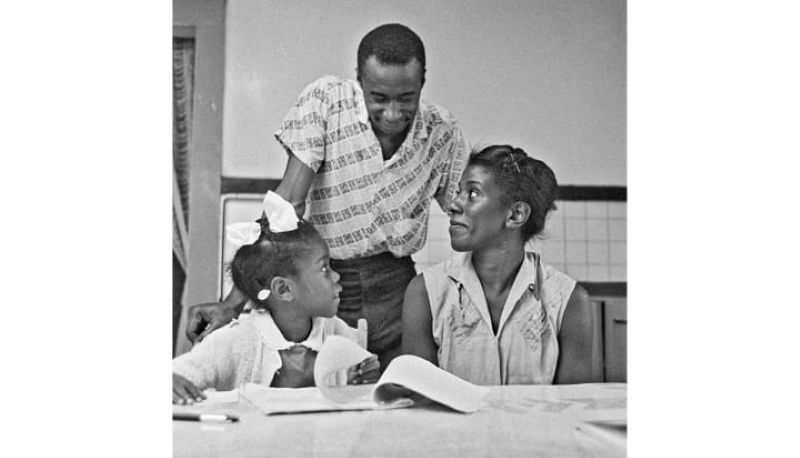When the story of the Civil Rights Movement is told, the spotlight often shines on leaders and public figures. Yet, behind every major breakthrough are individuals whose steadfast courage made change possible. Abon Bridges is one such figure. Best known as the father of Ruby Bridges, the first African American child to integrate an all-white elementary school in the South, his life was defined by resilience, sacrifice, and an unwavering commitment to justice.
Early Life in Segregated Mississippi
Abon Bridges was born on January 20, 1931, in Mississippi, at the height of the Jim Crow era. This was a time when segregation was the law of the land, and racial discrimination shaped every aspect of life for African Americans. Opportunities were scarce, and the barriers to education, employment, and voting were firmly in place. Growing up in this climate, Abon developed a deep understanding of the inequalities that surrounded him and the determination to push back against them.
Building a Life Through Hard Work
From an early age, Abon sought ways to create a better future for himself and his family. He found his calling as a mechanic, a skill that was highly valued in rural Mississippi during the 1940s and 1950s. Known for his reliability and technical ability, Abon became a respected figure in his community. His work was more than just a job—it was a testament to his dedication and his refusal to be defined by the limitations imposed by segregation.
Marriage and Family Values
In the 1950s, Abon married Lucille Bridges. Their union was built on shared principles of perseverance, integrity, and hope for the future. Together, they raised five children, with Ruby being the youngest. At the time, Abon was in his late twenties, balancing his career as a mechanic with the responsibilities of fatherhood. The Bridges household was rooted in the belief that education was the key to breaking free from generational poverty and limited opportunity. Both parents worked tirelessly—Abon in his trade and Lucille in domestic service—to provide stability and a sense of purpose for their children.
The Historic Decision That Changed Everything
In 1960, six-year-old Ruby was selected to integrate William Frantz Elementary School in New Orleans, following the Supreme Court’s Brown v. Board of Education decision that declared segregation in public schools unconstitutional. The choice to send Ruby to an all-white school was not made lightly. Abon and Lucille weighed the dangers carefully, knowing that their daughter would face hostility, harassment, and threats.
Ultimately, Abon agreed to let Ruby attend, viewing the decision as a stand for justice rather than just a matter of schooling. He understood that this was a rare opportunity to challenge the entrenched racism of the time, even though it would put his family in the crosshairs of public anger.
Facing Backlash and Loss
The backlash was swift and severe. Angry mobs gathered outside the school daily, hurling insults at Ruby. The family was ostracized in their own neighborhood, and Abon became a target at work. The harassment escalated until he lost his job as a mechanic—a devastating blow in a time when well-paying jobs for African Americans were already scarce. Despite the economic hardship, Abon remained steadfast. He refused to pull Ruby from school or yield to the pressure, embodying a quiet, enduring form of bravery.
Service to Country and Personal Resilience
Abon Bridges’ commitment to doing what was right extended beyond the civil rights struggle. He served his country in the Korean War, demonstrating his sense of duty and patriotism. Yet, like many African American veterans, he returned home to face the same systemic discrimination he had left behind. This contrast between risking his life for his country and enduring racial prejudice at home only strengthened his resolve to fight for a better future for his children.
Life After the Integration Battle
The years after Ruby’s historic walk into William Frantz Elementary were marked by both challenges and moments of peace. The Bridges family continued to live under the shadow of that decision, but they also experienced the small joys of family life. Abon found ways to provide for his household, proving that persistence could overcome even the most punishing setbacks. His children grew up knowing that their father’s quiet strength had paved the way for greater opportunities, not only for them but for generations to come.
Personal Life, Age, and Legacy
Abon Bridges lived a life defined by service and principle. Born in 1931, he lived into his 80s, passing away in 2010 at the age of 79. He was a devoted husband to Lucille and a proud father to five children. While his personal net worth was never publicly documented—largely because he lived in an era when African American families were excluded from many avenues of wealth accumulation—his true legacy was measured in the values he instilled in his children and the historic role he played in advancing civil rights.
Remembering Abon Bridges
Today, Abon Bridges is remembered not as a man who sought the spotlight, but as someone whose actions shaped the course of American history. His courage in the face of economic loss, social hostility, and personal risk set an example for what it means to stand by one’s convictions. Ruby Bridges’ historic journey to school could not have happened without the foundation her father provided. His story reminds us that the fight for equality has always been built on the shoulders of ordinary people who make extraordinary choices.









